African Institutions (Bachelor, Inter-African Business)
Institutions Leading the African Transformation (Bachelor of Science in Inter-African Business, e-learning, first semester)
| Bachelor of Science in Inter-African Business |
| Bachelor of Science in International Trade |

Subject - “Institutions Leading the African Transformation” (5 ECTS) - Online Bachelor of Science in Inter-African Business (first semester).
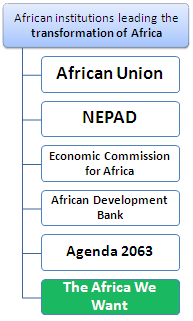
The main objective of the subject “Institutions Leading the African Transformation” is to understand the role of:
- African Union (AU): the “Policy vision - one United Africa”
- African Union Development Agency (AUDA-NEPAD): “The Executing Agency” of the African Union
- Economic Commission for Africa (CEA): organises all information to achieve the African Integration
- African Development Bank: financing the African Union vision
- Finally, we will study the “Agenda 2063: The future we want for Africa” a key document to understanding the vision of the African leaders

Syllabus of the Program: African Union
- Introduction to the African Union (AU)
- Objectives and member countries
- Constitutive Act of the African Union
- Pan-African Parliament
- Agencies of the African Union
- Department of Economic Affairs
- Financial Institutions of the African Union
- Central African Bank
- African Investment Bank
- African Monetary Fund
- African Union Commission on International Law
- African Union Commission
- Department of Trade and industry of the African Union Commission
- Division of Customs of the African Union
- Department of rural economy and agriculture
- Africa Agriculture Development Programme
- Division of Regional Cooperation and Economic Integration
- State of the African Integration
- Minimum Integration Programme
- African Financial Integration
- Division of Research and Economic Policy
- Private sector, investments and resources mobilization development
- Special Programs of the African Union
- AUDA-NEPAD
- Conference on Security, Stability Development and Cooperation in Africa
- Regional Economic Communities:
- Community of Sahel-Saharan States
- Economic Community of West African States Central
- Common Market for Eastern and Southern Africa
- Economic Community of West African States
- Intergovernmental Authority on Development
- Southern African Development Community
- Arab Maghreb Union (AMU)
- African Union Convention on Preventing and Combating Corruption
- African Union Convention on Preventing and Combating Corruption
- AU partners (EU, China, Japan, the U.S., Korea...)
African Union Convention on Preventing and Combating Corruption.
- Introduction to the African Union Advisory Board on Corruption
- Regional Anti-Corruption Programme for Africa
- African Union Convention on Preventing and Combating Corruption
Objectives of the Program “African Union (AU)”:
- To understand the objectives, functions and the affiliated institutions of the African Union (AU): the most important African institution
- To know the financial institutions of the AU (African Monetary Fund...)
- To analyze the role of the Department of Trade and Industry and the Department of Customs of the African Union Commission
- To understand the role of the African Union in the socio-economic development and African Integration (towards the African Continental Free-Trade Area)
- To understand the concept of “African Common Market”
- To evaluate the state of the African Integration and the Minimum Integration Programme
- To understand the relationship between the African Union and the Regional Economic Communities
- To understand the African Union Convention on Preventing and Combating Corruption
Syllabus of the Program: African Union Development Agency (AUDA-NEPAD).
- Introduction to the AUDA-NEPAD
- Governance Structures of the AUDA-NEPAD
- Secretary of the AUDA-NEPAD
- AUDA-NEPAD Planning and Coordinating Agency
- Strategic plan of the AUDA-NEPAD
- Thematic Areas of the AUDA-NEPAD
- Agriculture and food security
- Comprehensive Africa Agriculture Development Programme (PDDAA)
- Regional integration and the AUDA-NEPAD
- Infrastructures;
- African Union/NEPAD African Action Plan
- Transport in Africa. The Lobito Corridor
- African value chains
- Cross-cutting issues: gender, capacity development and information and communication technologies (ICT)
- E-Africa Program of the AUDA-NEPAD
- Economic and social governance
- African Peer Review Mechanism
- The AUDA-NEPAD and the African Regional Economic Communities
- Towards the continental free-trade area
Comprehensive Africa Agriculture Development Programme.
- Introduction to the Comprehensive Africa Agriculture Development Programme (PDDAA) of the AUDA-NEPAD
- The four pillars of the Comprehensive Africa Agriculture Development Programme
- Facilitating the access to markets and infrastructures
- Agricultural research
- African Forum for agricultural research
- Sustainable Land and Water Management
- Role of the Regional Economic Communities (REC) in the Comprehensive Africa Agriculture Development Programme
Objectives of the Program “African Union Development Agency (AUDA-NEPAD)”:
- To understand the objectives and work areas of the AUDA-NEPAD of the African Union
- To know the strategic plan and programs of the AUDA-NEPAD
- To analyze the role of the AUDA-NEPAD in relation to the Intra-African Trade, African value chains, transport in Africa, African Integration.
- To know the four pillars of the Comprehensive Africa Agriculture Development Programme
- To understand the African Peer Review Mechanism
- To understand the relations between the African Regional Economic Communities and the AUDA-NEPAD
Syllabus of the Program: United Nations Economic Commission for Africa (UNECA).
- Introduction to the United Nations Economic Commission for Africa (CEA)
- African Statistical Yearbook
- Vision: Putting Africa First
- Macroeconomic Policy of the UN Economic Commission for Africa (CEA)
- Economic Report on Africa
- Division of Trade and regional integration of the Economic Commission for Africa
- Regional Economic Communities (REC)
- Industrialization and infrastructures
- Investment Policy
- Food security and agriculture
- African Trade Policy Centre
- Foreign trade facilitation
- Observatory on African regional integration
- State of the African regional integration
- African value chains
- Continental free-trade area
- African Financial Integration
- African Road Safety Action Plan
- Social development.
- Post 2015 Development Agenda
- Natural Resources;
- Committee on Food Security and Sustainable Development
- Mineral resources and African development
- Innovation and Technology
- Gender
- African Women's Report
- African Centre for Gender
- Governance in Africa
- Combating Corruption improving the Governance in Africa
- Subregional Offices of the Economic Commission for Africa
- Central Africa
- East Africa
- North Africa
- South Africa
- West Africa
- African Centre for Statistics
- African Institute of economic development and planning
- Doing Business with the UN Economic Commission for Africa. The Procurement Services Unit
Objectives of the Program “Economic Commission for Africa (CEA)”:
- To understand the objectives (regional integration, African development...), structure and functions of the Economic Commission for Africa (CEA)
- To analyze the Macroeconomic Policy of the Commission
- To know the Economic Report on Africa
- To analyze the role and the areas of cooperation of the Division of Trade and Regional Integration
- To evaluate the social development programs, natural resources, innovation and technology, gender and governance of the Economic Commission for Africa (CEA)
- To analyze the role of the Commission in relation to the Regional Economic Communities (REC)
- To understand the functioning of the Procurement Services Unit of the Economic Commission for Africa (UNECA)
Syllabus of the Program: African Development Bank.
- Introduction to the African Development Bank
- Report on African development
- Structure of the African Development Bank
- African Development Bank strategy (2013 to 2022)
- African Infrastructures Development
- Regional Economic Integration
- Private Sector Development
- Governance
- Funds of the African Development Bank:
- Africa 50 Infrastructure Fund
- Africa Trade Fund
- African Financing Partnership
- African Financial Markets Initiative
- African Guarantee Fund for Small and Medium-sized Enterprises
- Financial instruments of the African Development Bank
- African Women in Business Initiative
- Agriculture and agro-industries;
- Agro-industrial Development
- African agriculture
- Case Study: impact of the global crisis in Africa
- Towards the continental free-trade area
Projects and operations of the African Development Bank.
- Introduction to projects and operations of the African Development Bank
- Doing Business with the African Development Bank
Objectives of the Program “African Development Bank”:
- To understand the objectives, structure and functions of the African Development Bank
- To determine the areas of cooperation of the African Development Bank
- To analyze the African Development Bank strategy
- To evaluate the funds and financial instruments of the African Development Bank
- To understand the projects and operations of the African Development Bank
Syllabus of the Program: The Agenda 2063 “The Africa We Want”
- Vision and priorities of the Agenda 2063
- African aspirations for 2063
- Integrated Continent
- Inclusive growth and sustainable development
- Peaceful and Secure Africa: “By 2020 all guns will be silent”
- Good Governance, Democracy, Human Rights, Justice and Rule of Law
- Africa as a strong, united and influential global player and partner
- Strong cultural identity, common heritage, shared values and ethics
- Development is people-driven, unleashing women and youth potential
- Roadmap of the Agenda 2063
- Factors for Africa's transformation

The subjects of the first semester of the Bachelor of Science in Inter-African Business.
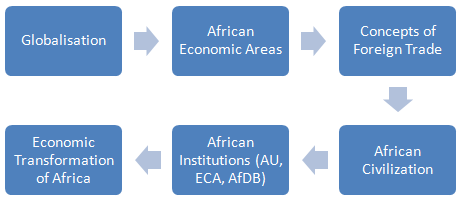
Note:
- ECTS = European Transfer and Accumulation System
- CECT = Credit of Capitalisable and Transferable Evaluation (CAMES)
Samples: Institutions Leading the African Transformation (Bachelor of Science in Inter-African Business, e-learning, first semester).
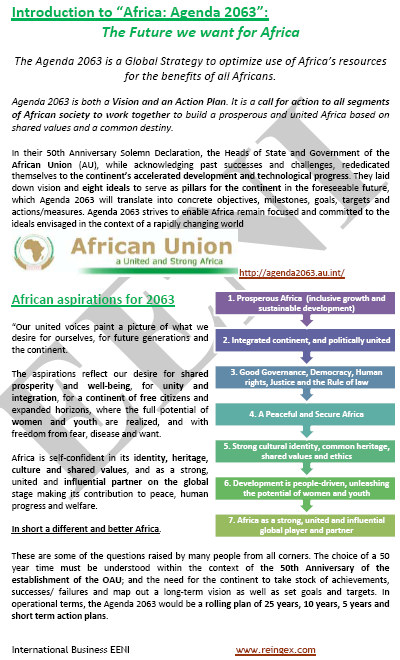
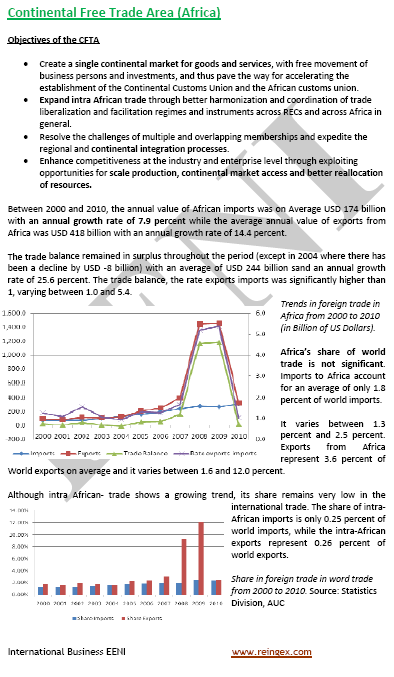
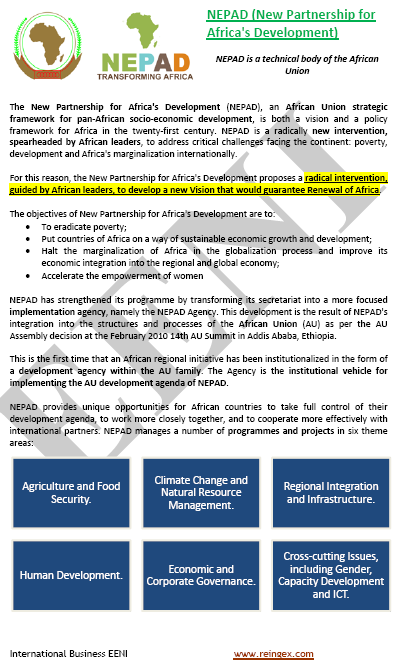
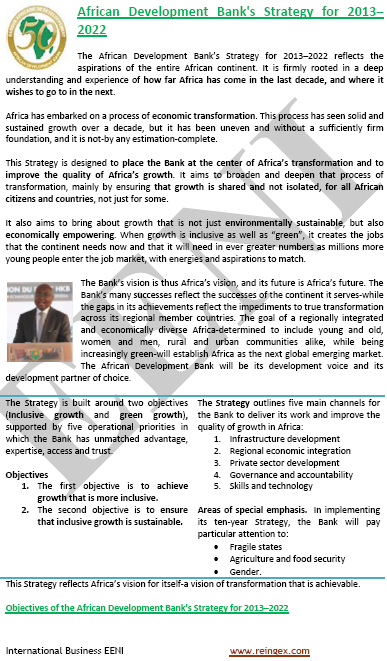
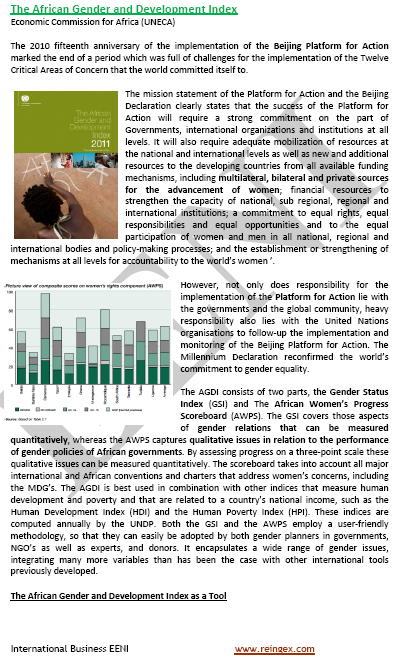
Language of the subject “Institutions Leading the African Transformation” of the Bachelor of Science in Inter-African Business taught by EENI Global Business School (first semester):  or
or  EENI
EENI  EENI
EENI  EENI.
EENI.
(c) EENI Global Business School (1995-2024)
We do not use cookies
Top of this page

